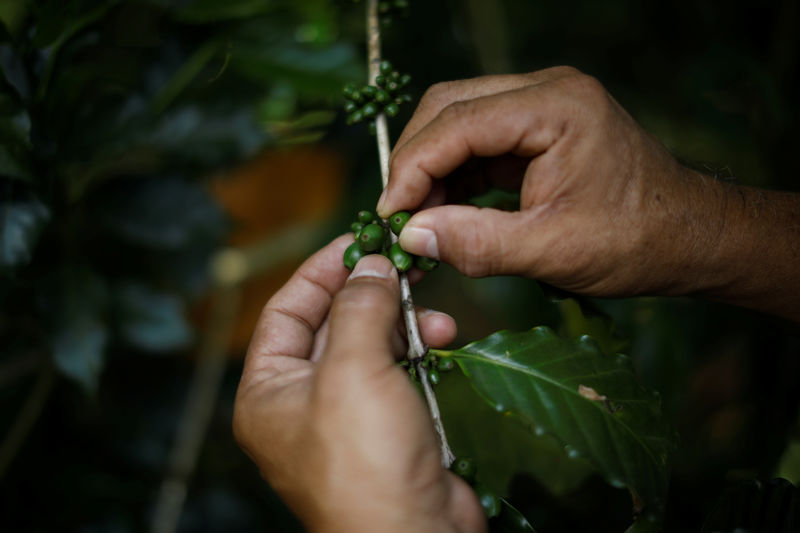By Marcy Nicholson
NEW YORK (Reuters) - For Alberto Ferracuti, a coffee grower in El Salvador, bourbon really does grow on trees.
Ferracuti and many other farmers in the Central American country have turned to speciality coffee trees - identified by fanciful names such as bourbon, geisha and pacas - in hopes of reviving a local industry devastated by crop disease just a few years ago.
The trees produce some of the world's highest quality coffee, beans with distinctive tastes prized by consumers in the United States and elsewhere who are willing to pay up for top-drawer coffee. Specialty coffee can earn farmers more than twice what they make selling standard varieties.
The result is that El Salvador, though a small producer by size, has one of the world's most diverse coffee crops. This year, El Salvador harvested about 740,000 bags, roughly 1 percent of what Brazil, the world's biggest producer, will produce.
But speciality coffee accounts for a rapidly increasing share of its production, giving it an outsized role in the high-end coffee market. Last year, speciality coffee made up about 65 percent of its exports, a figure expected to rise to 80 percent by 2025, according to Salvadoran Coffee Council data.
(For graphic, see https://tmsnrt.rs/2sja24e)
The strategy comes with a shot of risk: The trees are highly susceptible to the very crop disease, roya, that cut El Salvador's harvest by 60 percent four years ago. And the threat remains, with four new strains of roya just identified in neighbouring country Honduras, a U.S. attache reported last month.
"Some people think we're crazy to pursue this," said Ferracuti, whose family farms 75 hectares (185 acres) in central and western El Salvador.
Elsewhere in Latin America, where 60 percent of the world's beans are grown, many farmers have avoided speciality trees and reduced their crop diversity. Instead, they have concentrated on planting trees bred to increase yields and resist roya.
An air-borne fungus, roya thrives in warm and wet conditions, latches onto leaves and eventually damages or kills trees. An outbreak that hit production in the 2013/2014 crop year, the worst on record, cut coffee output in Central America by 10 percent. El Salvador was among the hardest hit, and has yet to fully recover.
Ferracuti and farmers like him aim to keep their trees safe from future roya outbreaks through a combination of improved husbandry and increased fertilizer and fungicide use.
Some said they are planning to replant trees every 10 to 12 years, rather than let them stand for decades, which is typical on many farms. This is potentially costly, but young trees have a better chance of fighting off the blight, they said.
MILK CHOCOLATE AND CITRUS ZEST
The global dollar-denominated benchmark coffee price for commercial grades of arabica beans, known as the "C" market (KCc1), has hovered around $1.20 per pound the past year.
That is about the same actual price that the coffee garnered in the 1980s, and is close to the cost of production in some mountainous countries such as El Salvador. The cost of production is higher on steep hillsides, where crops must be harvested by hand.
But speciality beans can cover those costs, plus some, given the premium they carry to standard varieties. Farmers said their speciality beans can fetch around $3.50 per lb, a premium of more than $2 over the current "C" price.
Selling against the "C" market is akin to putting money "in a bag with a hole," said Gilberto Baraona, whose family has farmed coffee in El Salvador for four generations.
Baraona, who lost 75 percent of his farm to roya, now farms bourbon and pacamara trees at higher elevations, where the combination of warm days and cool nights lessens the risk of disease and creates some of the highest quality beans. Baraona's speciality coffee export business has doubled in annual sales since 2010, he said.
"You can live with pacamara and bourbon if you have a system to combat disease," he said.
Brought to Latin America in the 1800s, bourbon is a relatively low-yielding tree - but what it produces is highly sought after in discerning coffee houses.
Cheryl Kingan, who buys red bourbon from family farms in El Salvador for speciality roaster Café Grumpy in New York, associates these beans with milk chocolate, hazelnut, graham cracker and candied citrus zest.
What's more, she said Salvadoran growers are experimenting with even more specialized beans, offering new, distinct flavours to their coffees.
"These smaller experiments take years to yield larger profit results, so in the meantime bourbon continues to shine and act as the workhorse of the Salvadoran speciality scene."
Eduardo Alvarez, operations manager for speciality coffee exporter El Borbollon in the country's third-largest city, Santa Ana, said that new producers bring quality beans to his business every year.

"The farmers that are surviving, are surviving because they're exploring this quality driven market," Alvarez said.